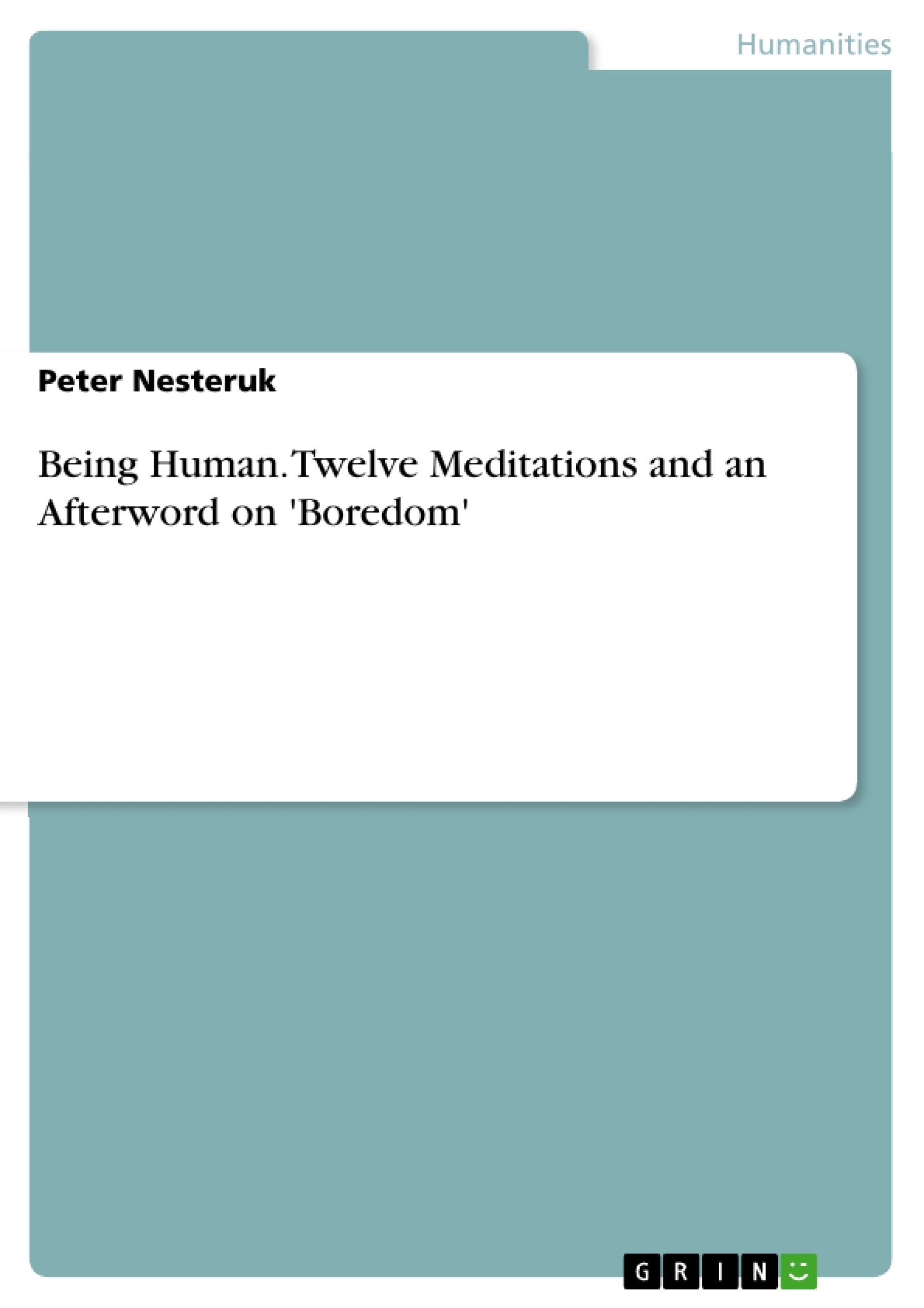This study comprises tweleve meditations on the basics of human experience and a critique of Heidegger's use of the concept of 'boredom'.Just what does happen when we take the actual human experience of temporality as the basis for understanding ourselves?
Inhaltsverzeichnis (Table of Contents)
- Beginnings (In Medias Res, 'after all').
- The 'Eternal Present.'
- Past and future (past experience).
- Gift of Place/Place of Gift.
- The 'Cut' /the Opening.
- Incoming.
- (Between) Subject and Object.
- (Between) Inside and Outside.
- Whole/hole: (Room/Architecture).
- 'Authenticity'.
- Hidden Terrors (Eternity/Other/Sublime).
- Ritual.
- Exchanges.
Zielsetzung und Themenschwerpunkte (Objectives and Key Themes)
This text explores the question of human existence through a series of meditations. It examines the nature of beginnings, the role of experience and memory, the relationship between subject and object, and the experience of time. The author seeks to understand what it means to be human in a world that is constantly changing.
- The nature of beginnings and the concept of "in medias res"
- The experience of time and the relationship between past, present, and future
- The relationship between the self and the world
- The role of language and culture in shaping human experience
- The exploration of "authenticity" and the search for meaning
Zusammenfassung der Kapitel (Chapter Summaries)
- Beginnings: In Medias Res/'after all'. This chapter discusses the challenges of defining a starting point for understanding human experience. The author argues that we are always already "in the midst of things" and that any attempt to find a pure beginning is doomed to fail.
- The 'Eternal Present'. This chapter explores the concept of the "eternal present" as a space between subject and object. It examines the role of perception, memory, and language in shaping our experience of the world.
- Past and future (past experience). This chapter examines the role of past experience in shaping our understanding of the present and the future. It explores the concept of memory as a form of telling to ourselves and the role of communication in shaping our understanding of the world.
- Gift of Place/Place of Gift. This chapter discusses the significance of place in human experience. The author argues that place is not simply a location, but a repository of meaning and history.
- The 'Cut' /the Opening. This chapter explores the notion of "the cut" as a way of understanding the relationship between subject and object. It examines the role of perception in shaping our experience of the world and the ways in which our senses can be understood as a "cut" in the surface of matter.
- Incoming. This chapter examines the nature of experience and the way in which we receive information from the world around us. The author discusses the role of language, culture, and memory in shaping our understanding of the world.
- (Between) Subject and Object. This chapter explores the relationship between subject and object. The author examines the ways in which we create meaning through our interaction with the world around us.
- (Between) Inside and Outside. This chapter examines the relationship between the inner and outer world. The author explores the ways in which our inner experiences are shaped by our interactions with the world around us.
- Whole/hole: (Room/Architecture). This chapter examines the role of architecture in shaping human experience. The author argues that architecture is not simply a functional space, but a symbolic representation of our relationship to the world.
- 'Authenticity'. This chapter explores the concept of "authenticity" and the search for meaning. The author examines the ways in which we try to find meaning in a world that is often chaotic and unpredictable.
- Hidden Terrors (Eternity/Other/Sublime). This chapter explores the experience of awe, fear, and the sublime. The author examines the ways in which these experiences can challenge our sense of self and our understanding of the world.
- Ritual. This chapter examines the role of ritual in human life. The author argues that ritual is a way of creating meaning and order in a world that is often chaotic and unpredictable.
- Exchanges. This chapter examines the nature of exchange and the ways in which we interact with the world around us. The author discusses the role of language, culture, and technology in shaping our interactions with the world.
Schlüsselwörter (Keywords)
The text centers on the themes of human experience, the nature of being, perception, memory, language, culture, time, and the search for meaning. It draws upon the works of various thinkers, including Heidegger, Husserl, and Feuerbach.
Frequently Asked Questions
What is the central theme of "Being Human"?
The text explores the basics of human experience through meditations on time, place, memory, and the relationship between self and world.
How does the author critique Heidegger's concept of boredom?
The afterword provides a specific critique of how Heidegger employs "boredom" within his philosophical framework of temporality.
What does "In Medias Res" mean in the context of human existence?
It suggests that humans are always already in the middle of their experience, with no accessible "pure" beginning to their consciousness or culture.
What is the "Eternal Present"?
A conceptual space where subject and object meet, shaped by the immediate perception and the role of language.
How is architecture used as a metaphor for human experience?
The chapter "Whole/hole" examines architecture as a symbolic representation of how humans structure their relationship to space and the world.
What role does ritual play in the text?
Ritual is analyzed as a means for humans to create order and meaning within a chaotic and unpredictable reality.
- Quote paper
- Dr. Peter Nesteruk (Author), 2014, Being Human. Twelve Meditations and an Afterword on 'Boredom', Munich, GRIN Verlag, https://www.grin.com/document/266677



